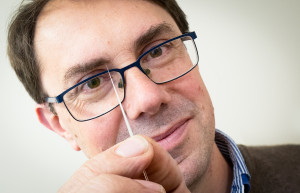Published Jun 1, 2023
In the transition to a carbon free society, understanding how efficiently electrochemical reactions occur on different surfaces will be a game changer.
At the moment, our understanding is limited – and that’s holding back a wide range of clean technologies, from batteries to electric vehicles and hydrogen fuel cells.
“Electrochemistry – using electricity to drive chemical reactions – is at the heart of technologies that underpin our clean energy transition,” explains Dr Kim McKelvey, a Senior Lecturer in Victoria University of Wellington’s School of Chemical and Physical Sciences.
Currently, there is no simple way to discover or design surfaces optomised for the electrochemical reactions they host. “It’s a bit of a guessing game. If you wanted to test the efficiency of a surface, you’d first need to build the device – battery or whatever it is – and then test how efficiently it works."
But Kim may have a solution. He’s invented a novel technology that makes it possible to efficiently measure electrochemical reactions across surfaces.

Dr Kim McKelvey's novel pipette
Still in the prototype stage, Kim's invention is a miniscule pipette that sweeps across a material, measuring the electrical signals that tell us what chemical reactions are happening on its surface. It then sends the information to specially designed software that creates a map of the surface. “This allows you to quickly and cheaply compare how well different surfaces conduct electrochemical reactions under almost real-world conditions, without having to build multiple versions of the whole device.”
It’s nano technology with near limitless potential, but Kim is particularly interested in applying it to build more efficient devices that convert electricity from renewable sources into fuel.
“Being able to convert electricity into sustainable fuel with maximum efficiency would significantly speed up our transition to clean energy.”
Kim is working with Wellington UniVentures to get his technology investor ready. Kim is currently enrolled in the KiwiNet Emerging Innovator Programme to help grow the entrepreneurial skills he needs to start a new venture from his research.
Wellington UniVentures Senior Commercialisation Manager Roger Zemp, who has been supporting Kim, says: "Kim is eager to work closely with industry and has a knack for inventing things that solve real-world challenges. Once he has developed the commercial acumen to sit alongside his research acumen, there will be no stopping him.”

Roger Zemp and Dr Kim McKelvey
